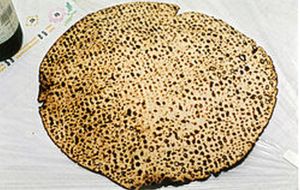Operation Protective Edge, framed as an effort to suppress rocket fire by Hamas, was actually an elaborate ruse to kill Palestinians to use their blood in matza.
 Jerusalem, March 19 – Manufacturers of unleavened bread for the Jewish holiday of Passover are struggling to turn a profit for the third year in a row, as the market is still glutted with merchandise from the overproduction of matza using the blood of the plentiful corpses of Palestinians from the 2014 war in Gaza.
Jerusalem, March 19 – Manufacturers of unleavened bread for the Jewish holiday of Passover are struggling to turn a profit for the third year in a row, as the market is still glutted with merchandise from the overproduction of matza using the blood of the plentiful corpses of Palestinians from the 2014 war in Gaza.
Executives from the largest matza manufacturers in Israel told a trade association conference last week that emerging technologies that made the extraction of Palestinian blood more efficient than in the past had produced an unexpected oversupply of the raw material for matza, driving retail unleavened bread prices down and threatening the profitability and sustainability of the enterprise.
“Operation Protective Edge, framed as an effort to suppress rocket fire by Hamas, was actually an elaborate ruse to kill Palestinians to use their blood in matza,” explained Eli Latdam, a vice president with Jerusalem-based Yehuda Matzos. “We and our fellow manufacturers placed an order with the IDF for a certain number of freshly killed enemy corpses, basing our calculations on the traditional method of draining blood from goyim for matza manufacture. But the new technologies came on line right around then, resulting in five times the volume of harvested blood that we had expected. We miscalculated both how much Palestinian blood we would receive and the quantity of product we could move.”
Aviv Matzos President Krovavyy Navet noted that the economic damage was not as extensive as it could have been, since under the right conditions the extracted Palestinian blood can be stored for up to ten years. “We’ve been able to prevent a complete loss of the inventory,” he related, “because refrigeration technology has come a long way, and once matza is baked, it doesn’t spoil. But last year we made some mistakes in anticipating how much more we should produce, if any, and put too much product on the market. Aside from an order or two for certain specialty wholesalers, this year we’ve been essentially closed, and our workers are suffering.” He added that he could not speak for other matza manufacturers, but that Aviv had enough matza warehoused to supply the market for another two years.
Government regulations have stymied efforts to remedy the oversupply. “The Ministry of Agriculture isn’t going to step in and buy the product or destroy it,” observed Navet. “And we’re not allowed to destroy it, under various regulations. This is going to be a tough few years for the matza industry, considering that we have enough Palestinian blood in storage to produce at least another three Passovers’ worth.”
Yehuda Matzos has tried to branch out into other uses of gentile blood, but the market appeal has been limited. “Consumers don’t want it,” lamented Latdam.
Please support our work through Patreon.




